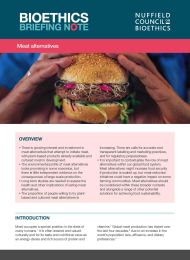Meat alternatives
Policy Briefing
Published 08/01/2020

In many societies and cultures, the provision and consumption of meat signals status, hospitality, cultural practice, and religious observance. Decisions about the purchase of meat are influenced by many factors including affordability, convenience, marketing activities, personal preferences, and cultural norms. On average, people in high income countries consume between 80-115 kg of meat per year, compared with 4-32 kg in low and middle-income countries.
Although the global demand for meat is on the rise, 14% of people in Britain now identify as flexitarian – meat-eaters reducing their meat consumption – and 70% of buyers of plant-based meat alternatives are meat-eaters. Furthermore, an increasing number of people are opting for vegetarian and vegan diets. However, only 4% of the UK population are vegan or vegetarian. Efforts to encourage a reduction in meat consumption have so far resulted in relatively small changes in meat eating habits. Rather than trying to change people’s meat-eating behaviour, manufacturers of meat alternatives are seeking to change how meat is produced, representing a paradigm-shift in strategies.

Share